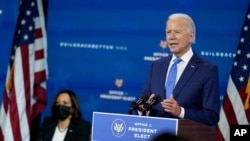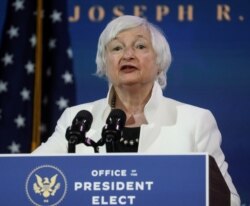U.S. President-elect Joe Biden met virtually Wednesday with American small-business owners and workers who have been impacted by the economic slowdown caused by the coronavirus pandemic.
Biden hosted the discussion from his hometown of Wilmington, Delaware, the hub of his transition activities seven weeks ahead of his inauguration on January 20. He also again received the president’s daily brief, the U.S. intelligence community’s assessment of the world’s trouble spots and any potential national security threats to the United States.
When he takes office, Biden will immediately be confronted with the slowing of the U.S. economic recovery brought on by the resurgence of the pandemic, even as the release of vaccines is anticipated later this month. Tens of thousands of new infections are being reported in the U.S. each day, and the death toll now has topped 272,000, more than in any other country, according to Johns Hopkins University.
As he introduced his key economic advisers Tuesday, Biden said he would push for more federal recovery aid but urged Congress to adopt any assistance it can muster the votes for this month, even before he takes office.
Janet Yellen, Biden’s nominee for treasury secretary, said, “The pandemic and economic fallout together have caused so much damage for so many and have had a disproportionate impact on the most vulnerable among us. Lost lives, lost jobs, small businesses struggling to stay alive or closed for good. So many people struggling to put food on the table and pay bills and rent.”
“It’s an American tragedy and it’s essential that we move with urgency,” she added Tuesday. “Inaction will produce a self-reinforcing downturn causing yet more devastation. And we risk missing the obligation to address deeper structural problems, inequality, stagnant wages, especially for workers who lack a college education.”
Yellen, a former chair of the U.S. Federal Reserve, the country’s central bank, cited other problems facing the world’s biggest economy.
“Communities that have seen industry disappear with no good jobs replacing lost ones. Racial disparities in pay, job opportunities, housing, food security, and small business lending that deny wealth building to communities of color. Gender disparities that keep women out of the workforce and keep our economy from running at full force.”
She called it “a convergence of tragedies that is not only economically unsustainable, but one that betrays our commitment to giving every American an equal chance to get ahead.”
Biden told New York Times columnist Thomas Friedman in an interview “you have over 10 million people out there who are worried [how] they can pay their next mortgage payment,” and “you have a significantly higher number of people who have no ability to pay their rent.”
When people “are out of the work force too long, you know, that makes it a hell of a lot harder for them to get back in the work force,” Biden said. “Many of them are losing years and years of opportunity.”
He also said that a new coronavirus aid package on top of $3 trillion in spending approved months ago would generate economic growth without long-term fiscal harm if in the future “everybody pays their fair share, for God’s sake. And by that fair share, I mean there’s no reason why the top tax rate shouldn’t be 39.6%,” compared to the current top rate of 37%.
He added, “There’s no reason why 91 Fortune 500 companies should be paying zero in taxes.”
On China, he said he would not move immediately to end the 25% tariffs that President Donald Trump imposed on about half of China’s exports to the United States.
Biden said he also would not end the trade agreement requiring Beijing to buy $200 billion in additional U.S. goods and services this year and next, a deal China has lagged in fulfilling.
Biden said he wants to consult with traditional U.S. allies in Asia and Europe, “so we can develop a coherent strategy” to deal with China.
“I want to make sure we’re going to fight like hell by investing in America first,” Biden said in the interview. “I’m not going to enter any new trade agreement with anybody until we have made major investments here at home and in our workers” and in education.








